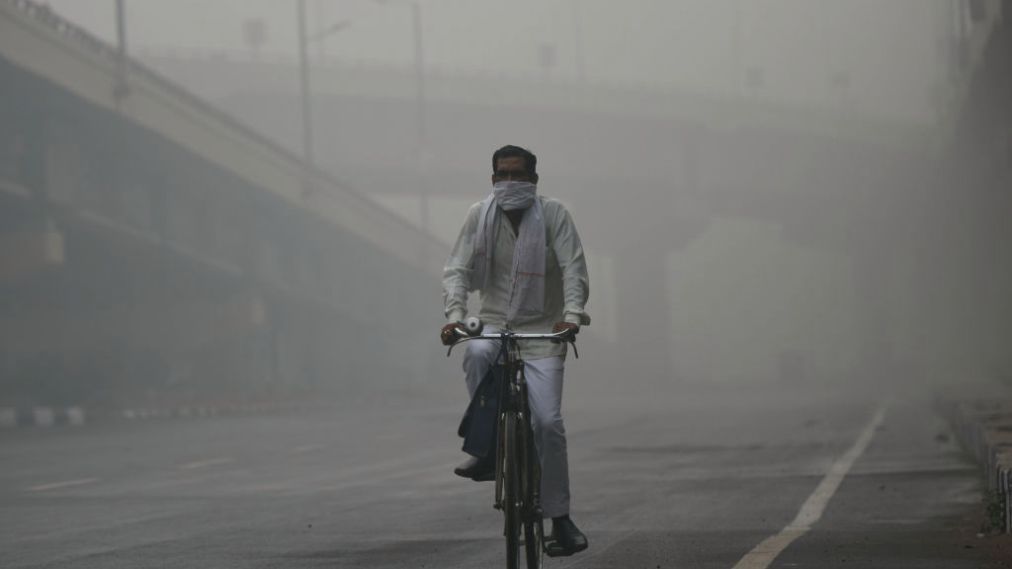(单词翻译:单击)
This is a highway in India...near Delhi.
这是印度的一条高速公路…位于德里附近的一条高速公路。
The smog here was so thick, drivers couldn’t see where they were going.
由于这条高速上的雾霾实在太大,司机们根本看不清前方的路面。
At least 24 vehicles were damaged as drivers kept crashing into the pileup.
当天,追尾事故一起接着一起,被毁车辆至少24台。
These conditions happen every year, when Delhi experiences a huge spike in air pollution.
然而,由于德里的空气污染急剧加剧,这类事故每年都有发生。
"Are we breathing poison in Delhi?"
“我们在德里呼吸的是毒气吗?”
"Every two minutes one person dies due to air pollution in this country."
“在这个国家,每两分钟就有一人死于空气污染。”
"I get nauseous. I get dizzy."
“我会出现恶心,头晕等症状。”
When it hits, the nearly 30 million people here are forced to live in a toxic cloud.
雾霾来袭时,此地的近3000万人瞬间陷入了有毒空气的笼罩之下。
Scientists estimate that spending a day outside in these conditions is like smoking 50 cigarettes.
据科学家估计,这种天气情况下,在户外呆一天给人体造成的危害相当于抽50支烟给人体造成的危害。
"As a lung surgeon, when I open the chest I rarely see a normal pink lung these days."
“作为一名肺部外科医生,最近我打开患者的胸腔时,已经很少能看到一个正常的粉红色的肺了。”
On the ground, a layer of dust covers the entire city,
整座城市的地面都蒙上了一层灰尘,
and, in the air, a thick layer of pollution hides landmarks that are easy to see the rest of the year.
非雾霾季颇为显眼的地标建筑此时也已消失在了厚厚的污染空气之中。
Delhi has always been a big, busy, polluted city.
德里一直是一个繁忙又有着严重污染的大城市。
But in the last decade, something is making it even worse.
然而,过去十年里,因为某个问题,德里已经在污染的道路上越走越远。
In the last 10 years, Delhi’s population has grown by more than 7 million people.
过去十年里,德里的人口增长了700多万。
Today it’s the second-largest city in the world and it’s also among the most polluted.
如今,德里已经成为全世界第二大城市,同时也是全世界污染最严重的城市之一。
More people means more cars spreading dust and exhaust into the air.
更多的人口意味着朝空气中排放灰尘和废气的汽车也就越多。
As Delhi grows, there’s also more construction, producing dust particles.
随着德里的发展,德里的建筑也越来越多,建筑产生的灰尘颗粒也越来越多。
And more industries, contaminating the environment.
还有越来越多污染环境的产业。
All these things make the average air quality in Delhi unhealthy year-round.
因为这些问题,德里一年四季的空气质量都不健康了。
But something else is happening right here, when air pollution in Delhi spikes in October and November.
然而,这个区间,也即10月到11月德里的空气污染飙升的时候,这个区间的出现是有原因的。
It sends air pollution levels to fifty times what’s considered safe.
这一原因导致德里的空气污染水平超出了安全标准的49倍。
"Levels go haywire. Many of the machines are not made to measure the levels that we achieve."
“空气污染水平直接爆表了。许多被我们用来测量空气污染水平的仪器根本就测不了这时候的污染水平。”
The smog is so bad , you can see it from space.
这个区间的雾霾严重到从太空都能看到。
But this cloud of pollution isn’t actually coming from Delhi.
问题是,这一污染并非来自德里。
It’s coming from here.
而是来自这里。
The states of Punjab and Haryana are known as "India’s Breadbasket."
旁遮普邦和哈里亚纳邦有着“印度粮仓”的美誉。
They’re a key region for the country’s agriculture.
两地是印度农业的一大支柱。
Farmers here grow rice and that requires large amounts of water.
这里的农民种植的是水稻,而种植水稻就需要大量的水。
In the 2000s, rice farming here took off, and farmers in the area started using so much water, that the region’s groundwater started running low.
本世纪初,这里的水稻种植业蓬勃发展,由于当地农民用水过多,当地的地下水开始枯竭。

So, to save water, authorities passed a new act in 2009.
于是,为了节约水资源,当局在2009年通过了一项法案。
It bans rice planting before mid-June.
禁止当地农民6月中旬之前种植水稻。
That means farmers can’t plant rice until right before the monsoon season, when rains come to replenish the groundwater.
这就意味着农民只能在雨季来临前夕种植水稻,因为雨季到来地下水就能得到补充。
That pushes rice harvesting later into the year, which means farmers have less time to get their fields ready for their next crop.
这样一来,水稻的收割就推迟了,这就意味着农民整理田地,准备种植下一季作物的时间就更短了。
So, to clear their fields more quickly, more and more farmers have started setting their crop stubble on fire.
所以,为了更快地整理田地,越来越多的农民开始火烧他们的作物残茬。
Every year, all those stubble fires form a massive cloud of smoke during October and November.
每年的10月和11月,这些残茬燃烧都会产生巨大的烟云
And it heads straight for Delhi.
直接飘向德里。
There are two reasons why smoke in this region makes things worse in Delhi.
之所以这个地区的烟会加剧德里的空气污染,原因有二。
The first is geography.
首先是地理原因。
The Himalayan mountains act like a kind of barrier, directing the smoke towards Delhi.
(东边的)喜马拉雅山脉宛如屏障一样将烟雾引向了德里。
The second is the weather.
其次是天气。
During the winter, cold mountain air rushes down from the Himalayas towards Delhi,
到了冬季,喜马拉雅山的冷空气直接朝德里涌来,
arriving beneath a layer of warm lowland air that creates a kind of dome over the city.
但其高度要低于来自低地的,如穹顶一般笼罩在德里上空的暖空气。
The warm air keeps pollution trapped on the ground with nowhere to go.
这层暖空气会将被污染的空气牵制在城市之内,令其无处可逃。
So when the stubble fire smoke arrives in Delhi,
于是,(旁遮普邦和哈里亚纳邦)燃烧作物残茬的烟雾飘到德里后,
it mixes with the urban pollution, forming a toxic smog that sits on top of the city.
便会与城市当地的污染结合在一起,形成一种有毒的烟雾,笼罩在城市上空。
Mix all that together and you have the most hazardous air pollution of almost anywhere.
所有这些因素综合在一起,就有了几乎是全世界毒性最强的污染空气。
In November of 2019, India’s Supreme Court ruled that states in the North had to stop farmers from burning their crop stubble.
2019年11月,印度最高法院裁定,北部各州必须让农民停止焚烧作物残茬。
But so far, the ruling hasn’t been enforced on the ground.
然而,到目前为止,这一裁决还没有真正落地。
In the weeks after the ruling, tens of thousands of crop fires continued to burn in Punjab and Haryana.
裁决后的几周时间里,旁遮普邦和哈里亚纳邦成千上万堆焚烧作物残茬的火堆仍在继续燃烧。
Delhi doesn’t have the ability to stop crop burning in neighboring states.
德里没有能力阻止邻邦焚烧农作物。
Instead, when pollution spikes in October and November, city officials change the things they can control:
不过,10月到11月污染飙升时,德里市政府官员改变了他们有能力改变的问题:
Sometimes they'll halt all construction in the city.
有时,他们会暂停城市的所有建设项目。
Or put restrictions on vehicle use.
有时会限制车辆的出行。
Still, until India’s ban on crop stubble burning is actually enforced, these spikes will be back every year,
尽管如此,在印度禁止焚烧作物残茬的禁令真正得以实施之前,这些峰值还是会年复一年地出现,
Making the city’s already dangerous pollution even worse and putting the lives of millions at risk.
使这座城市本就已经十分危险的污染变得更加严重,使数百万人的生命陷入危险之中。
"Here we are taking baby steps, but we are in a time period where baby steps won’t help anymore."
“我们当下采取的措施强度跟婴儿学步差不多,但现下,这样的强度根本起不了任何作用。”
"What we breathe should be fresh air."
“我们呼吸的应该是新鲜的空气。”


